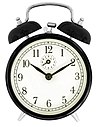Healthy eating habits/Choosing a Healthy Breakfast
This page aims to help you understand why it is important to be eating a healthy breakfast everyday. It also includes a simple guide to choosing breakfast cereals.

Why is breakfast important?
[edit | edit source]Well firstly.. it gives you energy! It's the first meal that you have when you wake up after a long night of fasting. It's there to 'break' the 'fast'. It's particularly important for your BRAIN, which need sugars to be able to work and concentrate properly.
It also boosts your metabolism! This means your body is working faster and burning more energy up. Breakfast fills you up, which makes you less likely to get hungry later and start eating snacks which are often high in energy and fat.
It has been found that people who eat breakfast are LESS LIKELY to become OVERWEIGHT.[1]
FINALLY.. it can be a great source of fibre, whole grains, vitamins and minerals.[2]
Do I have time?
[edit | edit source]
Not having enough time stops many people from having breakfast. BUT breakfast doesn't have to take a long time.
Here are some quick tips that can help you fit breakfast into your morning routine!
- Set your alarm 5 minutes earlier - make up for it by going to sleep 5 minutes earlier
- Have a simple breakfast - e.g. bowl of cereal, piece of toast
- Eat it on the go - take it with you
- Prepare or pack it the night before - e.g. soak your oats the night before so they're ready to eat when you wake up
Which breakfast cereal should I buy?
[edit | edit source]
Breakfast cereals can be a quick and easy meal to have in the morning. But when you're standing in the breakfast aisle of the supermarket, and hundreds of cereals are calling to you, which one should you choose??
SO, I've created a list of things to look at, which can help you to choose a healthy breakfast cereal. These include: fibre, whole grains, not a lot of sugar, salt, vitamins, and minerals.
Fibre
[edit | edit source]Adults are recommended to eat 25-30 grams of fibre every day.[3] This helps to keep your digestive system healthy and regular. It can also decrease your risk of bowel cancer, diabetes and heart disease. Fibre is found in breads, fruit, vegetables AND breakfast cereals.
- Try to choose cereals with at least 10% fibre in them[4]
You can check this by looking at the nutrition panel:
- Find the word 'fibre'
- Follow fibre across to the 'per 100g' column
- There will be a number here, which equals a percentage. e.g. fibre per 100g = 10g (this equals 10%)
Wholegrain
[edit | edit source]A grain includes 3 parts: bran, germ and endosperm. Some breakfast cereals are refined, with the bran and germ removed from the grain. This means 25% of the protein is lost as well as many vitamins, minerals, antioxidants and healthy fats.

SO.. we want to choose cereals which have the whole grain still in them!
- Find the cereals ingredients list
- Look for the word 'WHOLE' (e.g. whole wheat)
- The higher percent of whole grains the better
Sugar
[edit | edit source]This sweet substance is a source of energy BUT too much can lead to obesity, diabetes and tooth decay.[5]
Try and find breakfast cereals which contain:
- less than 15% sugar[4]
- less than 25% sugar if it contains dried fruit
To check the percent of sugar:
- Find sugar in the nutrition panel
- Look across to the column which says "per 100g"
- The number here is the percent of sugar this cereal contains (e.g. 10g per 100g = 10%)
If you find your cereal isn't sweet enough, try adding fruit as a sweetener instead of sugar.
Salt
[edit | edit source]There can be surprisingly large amounts of salt in cereals! Salt is made from sodium and chloride. Eating too much sodium can increase your risk of getting high blood pressure.[6]
Try and choose a cereal which has less than 400mg of sodium per 100g [4]
- find the word 'sodium'in the nutrition panel
- look across to the 'per 100g' column
- the number here is in mg (e.g. 400 = 400mg)
Vitamins and minerals
[edit | edit source]Many cereals can contain added vitamins and minerals which can help you achieve the daily amounts you need.

Don't forget you can:
- Add FRUIT for a great natural source of many vitamins.
- Add MILK or YOGHURT for a great natural source of calcium.
Healthy breakfast ideas
[edit | edit source]You don't have to stick to one breakfast cereal, keep breakfast fun and mix it up!
-
Porridge with fruit and nuts
-
Oatmeal with blueberries
-
Poached eggs with smoked salmon, spinach and wholegrain bread
-
Poached egg on wholegrain toast
-
Bowl of cereal
-
Fruit smoothie with milk and yoghurt
-
Tomato, avocado and cheese on wholegrain toast
-
Bowl of muesli with milk and fruit
References
[edit | edit source]- ↑ Mayo Clinic. (2018). People who eat breakfast gain less weight over time, study finds. Retrieved from https://inthenews.mayoclinic.org/2018/04/27/people-who-eat-breakfast-gain-less-weight-over-time-study-finds/
- ↑ DAA. (n.d.). Breakfast. Retrieved from http://daa.asn.au/for-the-public/smart-eating-for-you/nutrition-a-z/breakfast/
- ↑ NHMRC. (2006). Dietary Fibre. Retrieved from http://www.nrv.gov.au/nutrients/dietary-fibre
- ↑ a b c NHMRC. (n.d.). How to understand food labels. Retrieved from https://www.eatforhealth.gov.au/sites/default/files/files/eatingwell/efh_food_label_example_large.pdf
- ↑ Better Health Channel. (2011). Sugar. Retrieved from http://www.betterhealth.vic.gov.au/bhcv2/bhcarticles.nsf/pages/Sugar
- ↑ Better Health Channel. (2013). Salt. Retrieved from http://www.betterhealth.vic.gov.au/bhcv2/bhcarticles.nsf/pages/Salt?open







